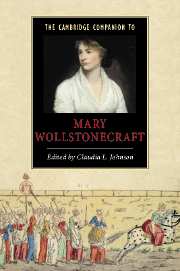Book contents
- Frontmatter
- 1 Introduction
- 2 Mary Wollstonecraft's letters
- 3 Mary Wollstonecraft on education
- 4 Mary Wollstonecraft's Vindications and their political tradition
- 5 Mary Wollstonecraft's French Revolution
- 6 Mary Wollstonecraft's literary reviews
- 7 The religious foundations of Mary Wollstonecraft's feminism
- 8 Mary Wollstonecraft and the literature of advice and instruction
- 9 Mary Wollstonecraft's A Vindication of the Rights of Woman and the women writers of her day
- 10 Mary Wollstonecraft and the poets
- 11 Mary Wollstonecraft's novels
- 12 Letters Written During a Short Residence in Sweden, Norway, and Denmark: traveling with Mary Wollstonecraft
- 13 Mary Wollstonecraft and the sexuality of genius
- 14 Mary Wollstonecraft's reception and legacies
- Select bibliography
- Index
7 - The religious foundations of Mary Wollstonecraft's feminism
Published online by Cambridge University Press: 28 May 2006
- Frontmatter
- 1 Introduction
- 2 Mary Wollstonecraft's letters
- 3 Mary Wollstonecraft on education
- 4 Mary Wollstonecraft's Vindications and their political tradition
- 5 Mary Wollstonecraft's French Revolution
- 6 Mary Wollstonecraft's literary reviews
- 7 The religious foundations of Mary Wollstonecraft's feminism
- 8 Mary Wollstonecraft and the literature of advice and instruction
- 9 Mary Wollstonecraft's A Vindication of the Rights of Woman and the women writers of her day
- 10 Mary Wollstonecraft and the poets
- 11 Mary Wollstonecraft's novels
- 12 Letters Written During a Short Residence in Sweden, Norway, and Denmark: traveling with Mary Wollstonecraft
- 13 Mary Wollstonecraft and the sexuality of genius
- 14 Mary Wollstonecraft's reception and legacies
- Select bibliography
- Index
Summary
Gracious Creator of the whole human race! hast thou created such a being as woman, who can trace Thy wisdom in Thy works, and feel that Thou alone art by Thy nature exalted above her, for no better purpose . . . [than] to submit to man, her equal – a being who, like her, was sent into the world to acquire virtue? Can she consent to be occupied merely to please him – merely to adorn the earth – when her soul is capable of rising to Thee?
(VRW 5:136)Admirers of Mary Wollstonecraft are often reluctant to see her as a religious thinker. This should not surprise us. The reiterated “appeals to God and virtue,” in A Vindication of the Rights of Woman are “a dead letter to feminists now,” a leading feminist critic tells us, and if by dead letter is meant a failed communication, then it is certainly true that of all aspects of Wollstonecraft's thought it is her religious faith that has failed to speak to modern interpreters. Most studies do no more than gesture toward it, and then usually dismiss it as ideological baggage foisted on her by her times, with no positive implications for her views on women. A Vindication of the Rights of Woman is generally located in a tradition of Enlightenment humanism that is assumed to have been at least indifferent to religion, if not actively hostile to it.
- Type
- Chapter
- Information
- The Cambridge Companion to Mary Wollstonecraft , pp. 99 - 118Publisher: Cambridge University PressPrint publication year: 2002
- 27
- Cited by

